Are you looking for the right decking material options to create a beautiful outdoor space in your Omaha, NE, home? There are numerous deck material options available, and it’s important to consider various factors when selecting a material.
From wooden decks to composite materials, this guide will provide all the information needed to choose the best deck material option for your home. With careful research, finding the perfect decking material is easier than ever – so let’s get started!
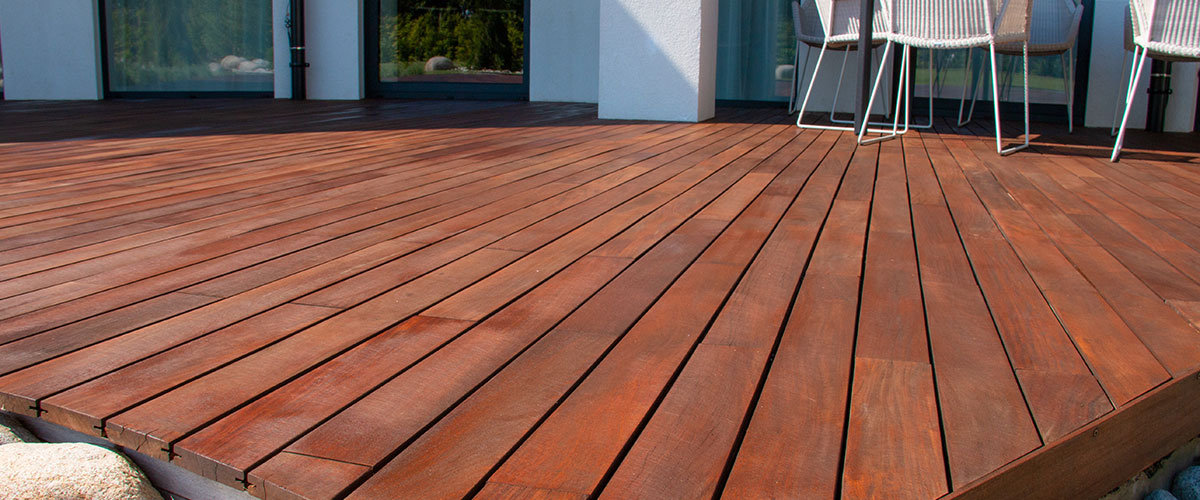
Key Takeaways
- It's important to consider factors such as durability, maintenance requirements, aesthetics, and cost when selecting the best decking material for your Omaha, NE, home.
- Different types of decking material options such as ipe hardwood, redwood, cedar, bamboo, mahogany, pressure-treated pine wood; composite deckings made from recycled plastic, wood fibers, and fillers like PVC; plastic deckings; aluminum deckings all offer great advantages depending on individual needs.
- High-quality woods like Ipe hardwood have great resistance to rot and decay but may be more expensive than others, while composite boards require low maintenance but often don't have the same appeal as traditional wooden decks. Aluminum decks are extremely durable yet lightweight and require minimal upkeep with their waterproof properties, making them ideal in full sun areas where heat damage can occur.
Types of Decking Material options
By understanding the features and benefits of each material, you can make an informed decision that aligns with your preferences and requirements for durability, maintenance, aesthetics, and cost.
Let’s dive into the world of decking material options and discover the perfect choice for your outdoor space.
Wood Decking
When considering what type of decking material to use for your Omaha, NE home, many homeowners often explore the different types of wood available. Wood decking materials such as Ipe hardwood, redwood, cedar, bamboo, mahogany, and pressure-treated pine are popular choices due to their individual advantages and unique properties.
- Ipe hardwood offers high durability and resistance to rot, insects, and weathering, along with its stunning natural beauty.
- Redwood is renowned for its rich color and natural resins, which provide resistance against decay.
- Cedar's affordability compared to other woods makes it a very attractive choice.
- Mahogany provides an aesthetically pleasing look in addition to insect and rot-resistant qualities.
- Pressure-treated lumber can also serve as an attractive option with great stability thanks to the preservatives it typically contains, allowing it to have better protection from water damage than traditional wood selections.
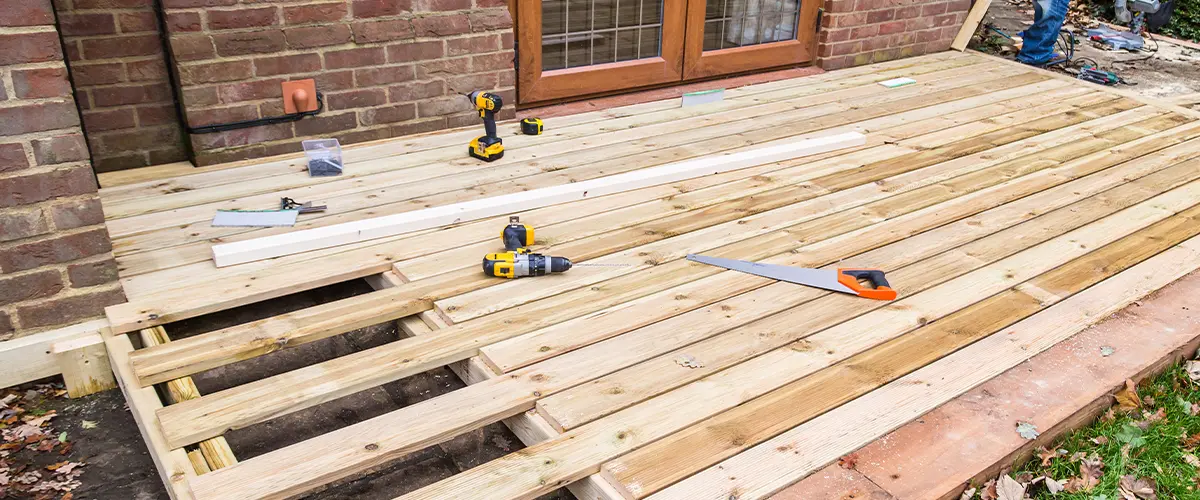
Composite Decking
Composite decking has become increasingly popular in recent years due to its range of benefits for homeowners. Unlike traditional wood decking, an uncapped composite decking doesn’t require sanding, staining, or resealing and is easy to clean with soap and water.
- Composite is extremely durable and resists scratches, stains, fading from UV rays in direct sunlight, as well as water damage which can cause rot on traditional wood decks.
- It won't splinter like other types of wood, making it an ideal material for decks that will be used often.
- Composite boards come at a more economical price than real hardwood boards such as Ipe or Redwood while still granting elevated aesthetics since you can choose from a variety of patterns, including the look of natural grains or exotic woods, without paying higher prices.
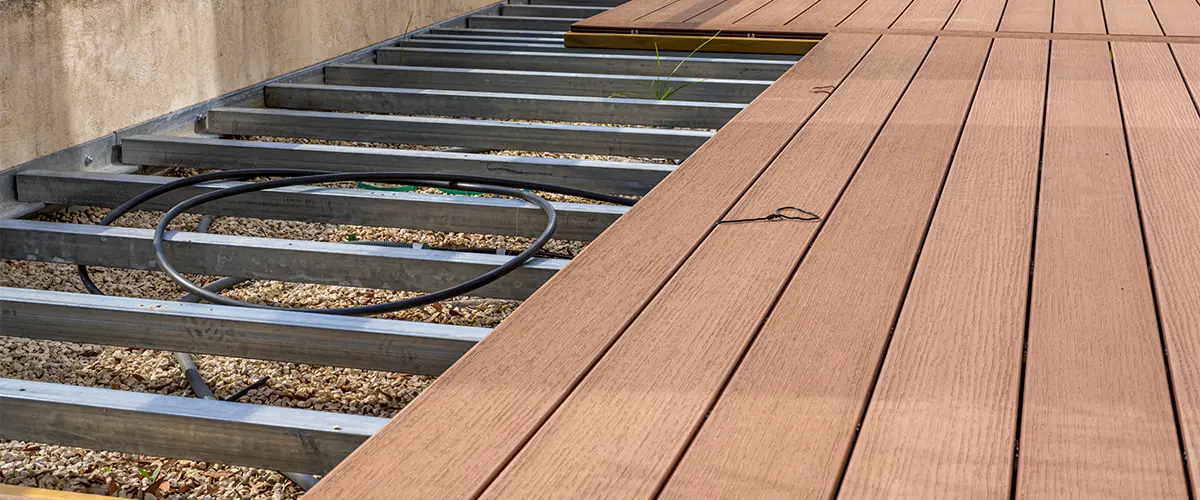
Plastic Decking
Offering great durability and low-maintenance qualities, plastic decking is a popular choice for homeowners in Omaha, NE. Made from a combination of wood fibers and plastics, it comes in a variety of colors and styles to suit any aesthetic design preference.
- Plastic decking requires minimal upkeep with just occasional washing needed with soap and water.
- This type of decking material also won't need staining or sealing, which saves time and money on maintenance costs down the line.
- Plastic decking is highly resistant to rot, insects, and decay, as well as harsh weather conditions like extreme temperatures so you can get all your use out of it season after season.
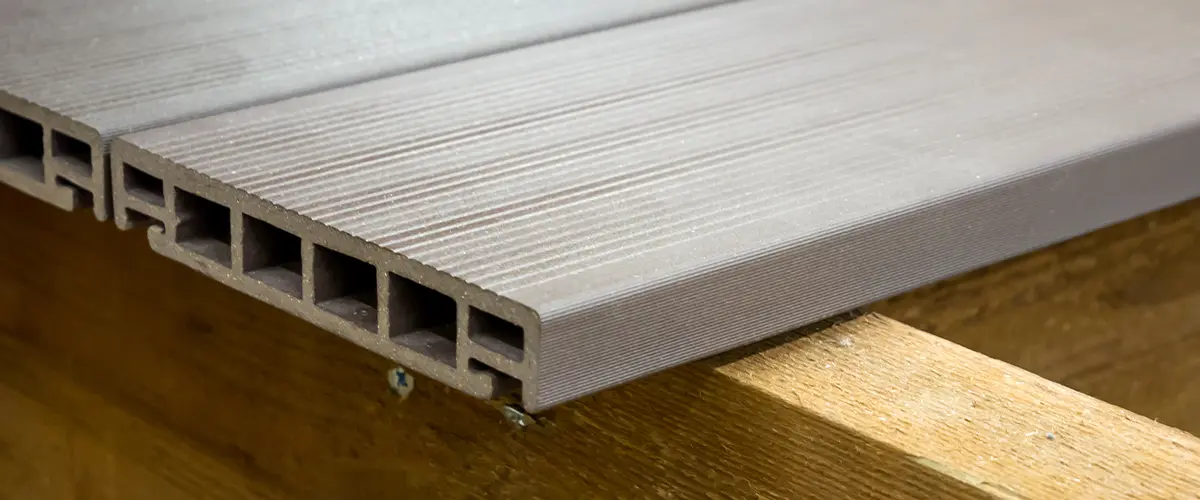
Aluminum Decking
Aluminum decking is a great choice for outdoor decks, with many unique benefits when compared to more commonly available materials. This sturdy material is lighter and stronger than wood and composite decking components, making it easier to install and handle.
- Aluminum provides great longevity since it’s resistant to rust, corrosion, rot, mold, splintering, and warping.
- Aluminum decks won't require staining or sealing like traditional wood decks, saving you time in maintenance while still providing an aesthetically beautiful finish.
- Aluminum decking is ideal for full sun areas due to its resistance to heat damage; popular brand Lockdry even claims that their aluminum boards are waterproof! Omaha homeowners can consider the lightweight yet strong nature of aluminum along with its durable, low-maintenance design when deciding which type of materials suit their needs best.
Factors to Consider When Choosing Decking Materials
Durability
When selecting between the different decking material options for a synthetic or natural wood deck in Omaha, NE, durability can’t be overlooked. It’s important to invest in a material that is long-lasting and of good quality.
- High-quality wood such as Ipe hardwood or Redwood is known for its superior resistance to rot and decay and can last up to 25 years if properly maintained.
- Composite decking made from recycled plastic, wood fibers, and other fillers like PVC offers excellent resistance to moisture, fading, mold/mildew growth, warping, and splintering when regular upkeep is done, including cleaning with water and soap solution frequently.
- Metals like aluminum also provide outstanding durability since they do not have pores that allow moisture through while being resistant to insect attacks too. Balancing aesthetics and durability will help maintain your deck's value over time, given its high investment in Omaha homes.
Maintenance Requirements
- Wood decks require regular staining and sealing every 1-2 years depending on exposure levels and sweeping away debris that can cause rot or mold growth.
- Composite boards are considered virtually maintenance-free and don't need to be stained or sealed; however, it's still important to clean them regularly with mild soap and water to prevent the buildup of dirt or leaves, which could lead to discoloration or fading over time.
- Plastic decking needs little more than occasional cleaning with soapy water; however, it may become scratched more easily than other types of deck materials.
- Aluminum decks have similar low maintenance needs as plastic, but the surface should also be checked periodically for any small areas that have begun flaking off due to weather wear.
Aesthetics
- Different decking materials offer a variety of look and feel options, from natural wood grains and classic colors to modern designs with textured finishes.
- Color and texture can also affect how guests interact with your space; for example, darker colors may give off an intimate ambiance, while lighter varieties could reflect energetic vibes.
- It's important that the overall appearance of the deck harmonizes with its surroundings so that it does not seem out of place or disrupt its architecture. Fortunately, our selection of dealer-stocked items provides clients with many customizable choices to pick from regarding design features like patterned boards or detailing, which allows them to create a truly one-of-a-kind outer escape!
FAQs
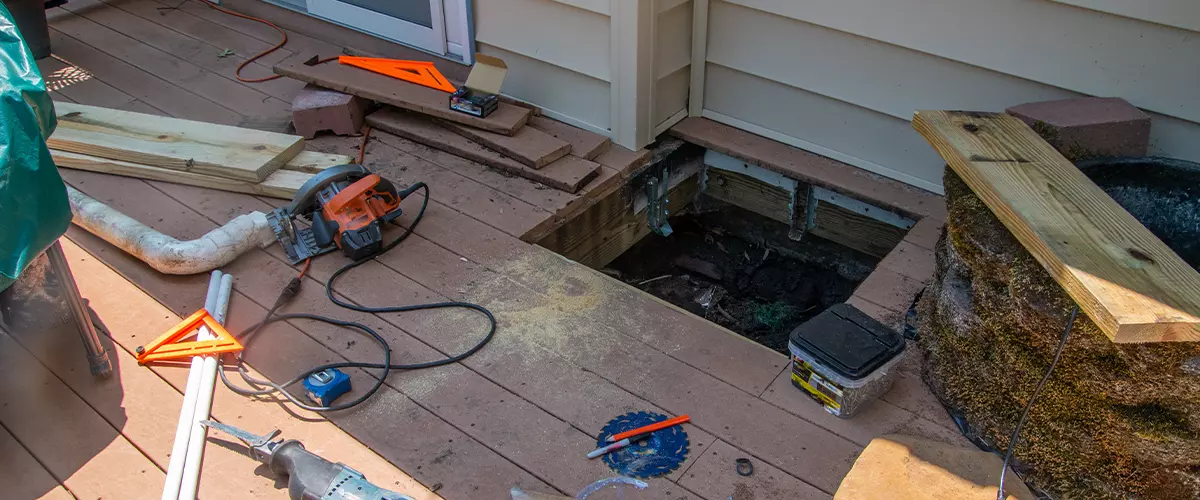
Reach Out To Omaha's Deck Pros
From deck installation to deck repair, we are your trusted Omaha contractors. We can install different types of decks and guide you through the material choices, explaining the pros and cons of each. If you’d like to know more about decking materials or want us to build you a stunning new deck, contact us at (402) 369-5724.
